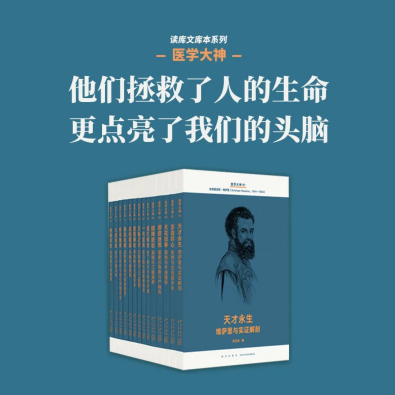
Press: Mr. Zhu Shisheng's new "Human and disease" series has been freshly released, and friends who have placed orders should receive this set of new books in the next two days. While you're waiting, come and revisit the companion book, "The Great God of Medicine," both to review its highlights and to prepare for the new book. To borrow the words of medical researcher Qiu Zilong: "For too long, the Chinese world has not had such good original science popularization."
As a serious biomedical researcher, I hesitated for a long time after seeing the name "medical god." First, the title of the book, it seems not too "serious". Second, to write biographies for so many medical giants, it is not just to resell the second-hand knowledge that can be found on the Internet, and turn it into a chicken soup for selling life insights or "subverting cognition"?
Out of trust in the reading library brand, decided to buy a look, after reading the first book "Genius Lives forever: Vesalius and empirical Anatomy", very shocked: First, the content is very serious, and the writing is scientific, historical and interesting; second, in the Chinese world there is almost no information on Vesalius, the author entirely selected from the original Western biography, to write Vesalius this 70,000 word biography.
I can not help but read this set of 14 books, a total of 900,000 words "medical God" series of books, to the author of the teacher Zhu Shisheng deeply respect, and warmly recommend to all my friends, especially medical students friends.
Now, according to the several threads in the whole book, talk about the overall feel of the book.
Modern medicine emerging from a "world haunted by demons.
The first owner of this series of books, Vesalius and the second owner, Harvey, the achievement is to free medicine from the ancient ignorance and semi-ignorance. Before Vesalius, although medicine had some achievements, it could be said that it was still a "world haunted by demons", full of speculation and speculation. The most obvious example is that the Galen medical textbook, which was canonized at the time, contained errors in human anatomy, but no one dared to point them out.
Vesalius truly understood the human body with positive anatomy, which was the first application of scientific positivism in medicine. Harvey went a step further, using dynamic research methods to discover the blood circulation of animals, including humans. Their work laid the foundations of modern medicine. Both lived during the Renaissance, coinciding with the scientific Renaissance of that time.
For these two, I only knew a few rigid descriptions from medical textbooks, and Vesalius published a book one year, and so on. Teacher Zhu Shisheng carefully consulted the large English original, and carefully described the life of Vesalius and Harvey five or six hundred years ago, even including some small details of life recorded in foreign biographies, which was interesting to read. These two biographies can be said to be the only original works in the Chinese world.
The most rare thing is that teacher Zhu Shisheng, who has been practicing medicine for more than ten years, also focused on explaining the background, difficulties and wonderful places of the research at that time. For example, what mistakes Galen made before Vesalius in anatomy, and what methods Vesalius used to prove them. How Harvey worked out the details of the heart's involvement in blood circulation from animals. Not only did it help me review physiology, but it also allowed readers with no background in biomedical science to enjoy the wonderful aspects of medical research. This feature of medical science runs through the book, and I personally think it is one of the best parts of the whole book.
The birth of medical science
Every country in the world has a medical science academy. When does medicine become a science? Although medicine relies heavily on the subjective experience of doctors, modern medicine must be evidence-based. The original English text of evidence-based is evidence-based, which means that no matter what judgment, it must be supported by evidence, and what is not supported by evidence is not modern medicine. Evidence-based medicine has become an important branch of science. There is no distinction between Western medicine and Chinese medicine, only between non-modern medicine and modern medicine. Every country has practitioners of non-modern medicine, but I think that when we ourselves and our families are ill, the first thing we think of is to go to a modern hospital.
The "Medical God" series credits Jenner for discovering vaccinia. Before Jenner, many people, even the whole country, knew how to vaccinate against smallpox, but the vaccination had not been tested by evidence-based medicine and failed to convince more people to accept it. It was Jenner who, step by step, through medical experiments, revealed the fact that vaccinia could fight smallpox, allowing people all over the world to accept the vaccine. Although this vein of evidence-based medicine originated from Jenner, who was born in the 18th century and worked mainly in the early 19th century, it will not become the universal practice of medical science until more than 100 years later, when the control group in drug trials becomes the norm, and more truly effective drugs can benefit people around the world. For example, the book "Medical God" tells of the birth of the real drug penicillin after the 20th century. Fleming, who discovered penicillin, did not use the method of setting up a control group, so ten years after the discovery of penicillin, he decided that penicillin could not be used as a broad spectrum antibacterial drug and gave up the research. Later, the Oxford team led by Flory overcame many difficulties to produce enough penicillin, and did wonderful controlled experiments on animals, proving that penicillin can resist infection in one fell fell, thus announcing the birth of the drug.
Overcome two major surgical challenges: pain and infection
Throughout the "Medical God" series of books there are two major problems of surgery, Zhu Shisheng teacher mentioned three, the first bleeding by the French surgical god Pare with suture method to solve, then left the world two problems, pain and infection.
The resolution of pain is a bizarre story of many opinions, and the emergence of ether as the first widely used anesthetic is full of drama, including various disputes over the discovery of ether. Zhu tells the story in "The Ether Tablet: Morton and Ether Anesthesia," starting with the medical background of analgesia research, why it's an important issue, what methods have been used before, and the introduction of the main character, Morton. After reading several relevant English original books, Zhu faithfully restored all aspects of Morton's protagonist, including his unreliable prodigal character and his credit for the discovery of ether. There are four protagonists in the story of ether, this book restores the contributions of the four one by one, and finally tells the outcome of their respective, reading to feel that the beginning and the end, lamenting the impermanence of life, important scientific discoveries need personal efforts, the support of predecessors and the circumstances of the occasion.
The medical conquest of infection is one of the greatest epics in the "Medical Gods" series. The epic begins with Semmelweis's theory of puerperal fever infection, Liszt's surgical disinfection as the first movement, Pasteur and Koch's discovery of the relationship between bacteria and disease as the second movement, and Fleming's discovery of penicillin as the final chapter of the epic on the conquest of infection.
In each biography, Zhu Shisheng recorded in detail the background of medical discoveries and the process of medical research. For a variety of reasons, some discoveries are widely beneficial, such as Liszt's surgical sterilization, while others, such as Semmelweis's theory of puerperal fever, are due to the discoverer's failure to record the communication in a scientific way and not really spread to patients around the world. Let me very sigh that even the most important scientific discovery, if not widely recognized by the peers, scientific significance is always limited. Scientists are also living in a community, must use the language of science, active scientific communication, even if sometimes there is a conflict with the predecessor's theory, there is enough evidence to support the case, the scientific community will definitely give enough affirmation.
Medical god and hospital, medical school reform
In terms of being misled by the title of the series at first, because the only two gods in my mind are probably Pasteur and Koch. After reading this series of books, I supplemented my blind spot of knowledge, and the following medical gods were added to my mind: Felschau, Liszt, Nightingale, and Osler. What struck me about these great gods was not only their medical contributions, but also their contributions to society and their important contributions to the reform of hospital medical schools.
First of all, Fershao, in my old knowledge, the Chinese world often translated as Virchow, has made great contributions to cytopathology. Read Zhu teacher's book, just know that Felshao is a great god, the title of this biography is "a generation of masters: Felshao and cytopathology", life can be summarized in such a few words: young fame, revolutionary frustration, academic dedication, the first Zongli school. In addition to his impressive medical contributions, the book also contains several interesting anecdotes, including Felsho's dream of transforming society, that public health and public policy have played a role in people's health more than medicine itself. In 1848, he resolutely joined the street revolution, and later because of this, he was suppressed in his career. After becoming famous, he still engaged in politics, and played a great role in the medical reform and public health reform of society. But Felschau never believed that bacteria caused disease and could not understand evolution. Despite the defects, Felsho's medical contributions are worth studying for students in the Chinese-speaking world.
The description of Nightingale in the book is also very unexpected to me. In addition to the traditional image of carrying lights on patrol, I did not expect that Nightingale also played a huge role in the reform of the hospital system when she was sick in her later years. I had only known Osler for his contributions to Hopkins Medical School, but after reading this biography, I realized that he was a great teacher and master, and the details of Osler's love for his children and the death of his own son on the battlefield were also very sad and tearful.
As for Liszt's surgical disinfection, I am most amazed that the already famous Liszt went to Paris to congratulate Pasteur on his 70th birthday, and the two giants warmly embraced. This is a great victory for science and medicine. Surgical disinfection saved countless lives before the advent of antibiotics, and Lister's thinking was based on Pasteur's scientific research.
peroration
After reading "Medical God", the heart can not be calm for a long time, too long, the Chinese world is not so good original science popularization. I had read biographies of scientists written by foreign writers, quoting extensively, which not only recorded the life of the authors, but also important scientific and medical discoveries, and lamented when the Chinese world had its own original works. Each of Zhu Shisheng's books has been conceived from first-hand sources, and finally condensed into a biography full of context and medical knowledge. The "Medical Gods" series has contributed an important medical history to the Chinese world. I think medical students should read this series of books to clarify the development of modern medicine and familiarize themselves with the masters who made important contributions to the birth of modern medicine.
This book is like the biography of historical records, which is the master biography of modern medicine in my mind. I warmly recommend this book series to my friends again!
Written (author) : Qiu Zilong


